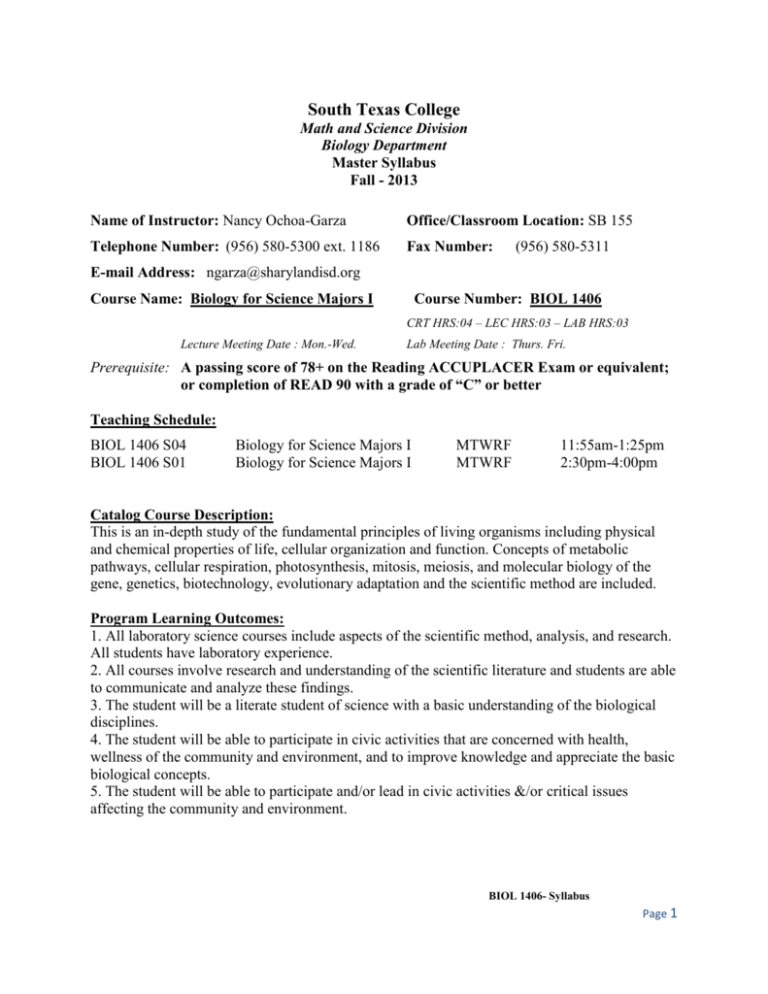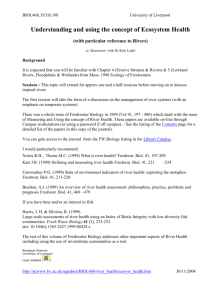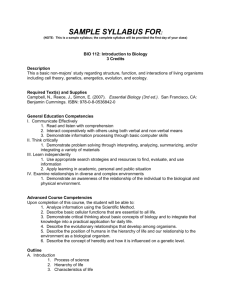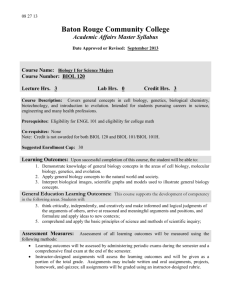South Texas College - Sharyland Pioneer High School
advertisement

South Texas College Math and Science Division Biology Department Master Syllabus Fall - 2013 Name of Instructor: Nancy Ochoa-Garza Office/Classroom Location: SB 155 Telephone Number: (956) 580-5300 ext. 1186 Fax Number: (956) 580-5311 E-mail Address: ngarza@sharylandisd.org Course Name: Biology for Science Majors I Course Number: BIOL 1406 CRT HRS:04 – LEC HRS:03 – LAB HRS:03 Lecture Meeting Date : Mon.-Wed. Lab Meeting Date : Thurs. Fri. Prerequisite: A passing score of 78+ on the Reading ACCUPLACER Exam or equivalent; or completion of READ 90 with a grade of “C” or better Teaching Schedule: BIOL 1406 S04 BIOL 1406 S01 Biology for Science Majors I Biology for Science Majors I MTWRF MTWRF 11:55am-1:25pm 2:30pm-4:00pm Catalog Course Description: This is an in-depth study of the fundamental principles of living organisms including physical and chemical properties of life, cellular organization and function. Concepts of metabolic pathways, cellular respiration, photosynthesis, mitosis, meiosis, and molecular biology of the gene, genetics, biotechnology, evolutionary adaptation and the scientific method are included. Program Learning Outcomes: 1. All laboratory science courses include aspects of the scientific method, analysis, and research. All students have laboratory experience. 2. All courses involve research and understanding of the scientific literature and students are able to communicate and analyze these findings. 3. The student will be a literate student of science with a basic understanding of the biological disciplines. 4. The student will be able to participate in civic activities that are concerned with health, wellness of the community and environment, and to improve knowledge and appreciate the basic biological concepts. 5. The student will be able to participate and/or lead in civic activities &/or critical issues affecting the community and environment. BIOL 1406- Syllabus Page 1 Core Component Exemplary Educational Objectives: 1. Relate and apply method and appropriate technology to the study of natural sciences. 2. Identify scientific and quantitative methods and the differences between these approaches and other methods of inquiry and to communicate findings, analyses, and interpretation both orally and in writing. 3. Identify and recognize the differences among competing scientific theories. 4. Demonstrate knowledge of the major issues and problems facing modern science, including issues that touch upon ethics and values and public policies. 5. Demonstrate knowledge of the interdependence of science and technology and their influence on, and contribution to modern culture. Course Learning Outcomes: 1. List steps of the scientific process and utilize laboratory equipment including microscopy to conduct laboratory experiments, collect and analyze data, employ critical thinking to make informed decisions in the laboratory, and communicate results. 2. Describe the characteristics of life, properties of biomolecules, and basic metabolic pathways including photosynthesis and cellular respiration. 3. Define characteristics of prokaryotic and eukaryotic cells, and outline cell reproduction, meiosis, and the functioning of the plasma membrane and organelles. 4. Recall basic chromosome structure, DNA replication, transcription of DNA into RNA, translation of RNA into protein, and biotechnology; match these processes to principles of inheritance; and reproduce simple genetic crosses and pedigree charts. 5. Distinguish the evidence for evolution through natural selection, understand the link between the unity and diversity of life and relatedness through common descent, and state the importance of the theory of evolution in unifying biological study. Departmental Course Intellectual Competencies: 1. Reading: Students will read, analyze and interpret the chapters in the text and lab manual covered in class as well as assigned journal articles and master both general methods of analyzing printed materials and specific methods for analyzing the subject matter of individual disciplines. 2. Writing: Students will produce clear, correct and coherent prose adapted to purpose, occasion and audience. Students will discover a topic and develop and organize it and phrase it effectively for their audience through practice and reflection. 3. Computer Literacy: Students will use computer based technology in communicating, solving problems, and acquiring information. Students should have an understanding of the limits, problems, and possibilities associated with the use of technology, and should have the tools necessary to evaluate and learn new technologies as they become available. 4. Speaking: Students will use clear, coherent, and persuasive language when speaking, using language appropriate to purpose, occasion, and audience. Students will acquire poise and develop control of the language through experience in making presentations to small groups, to large groups, and through the media. 5. Listening: Students will analyze and interpret various forms of spoken communication. 6. Critical Thinking: Students will embrace methods for applying both qualitative and quantitative skills analytically and creatively to subject matter in order to evaluate arguments and BIOL 1406- Syllabus Page 2 to construct alternatives strategies. Students will do problem solving as one of the applications of critical thinking, used to address an identified task. Departmental Course Perspectives: 1. Recognize the importance of maintaining health and wellness. 2. Develop personal values for ethical behavior. 3. Integrate knowledge and understand the interrelationships of the scholarly disciplines. Departmental Course Requirements: STC Departmental Guidelines: 75% Lecture: 40% Lecture exams 15% Term Paper/Project 20% Final exam 25% Lab: 10% Lab practicals 10% Other 5% lab quizzes Sharyland High School Guide lines: 60% Major Assignments: Lecture exams Term Paper Projects 40% Minor Assignments: Lab practicals Lab quizzes Lab assignments For students enrolled in Biology DE/AP, two different grades will be submitted. A letter grade will be submitted to STC based on STC’s Biology Departmental grading guidelines. A numerical grade will be submitted to Sharyland High School based on Sharyland ISD grading guidelines. For students not enrolled in Biology DE, a numerical grade will only be submitted to Sharyland High School based on Sharyland ISD grading guidelines. Resources: McGraw-Hill Connect™ Web-based LearnSmart™ Study Modules, library, multimedia, internet, and Biology Computer Lab Textbook: Biology with Connect Plus by Peter H. Raven, George B. Johnson, Kenneth A. Mason, Jonathon B. Losos, and Susan R. Singer McGraw-Hill Publishing Co. ISBN 978007812800-4 Biology 1406/1407 Lab Manual, McGraw-Hill Publishing Co. ISBN 978007804873-9 BIOL 1406- Syllabus Page 3 Materials: Quadrille Composition book for Labs Developmental Studies Policy Statement: Failure to remain in at least one developmental Studies course for students who have not met the passing standard on an approved assessment instrument in reading, writing, and / or mathematics may result in the student’s withdrawal from ALL college courses. All developmental courses including the College Success course will be included in the Semester Grade Point Average (GPA) for all students at STC. Students in Developmental studies will be limited to a maximum of 13 credit hours of course work per semester and 7 credit hours per summer session. Students taking 12 or more credit hours per semester who have not met the passing standard on an approved assessment instrument will be required to take two or more developmental courses every semester if they are deficient in more than one academic skill (reading, writing, and mathematics). Teacher Outcomes: It is expected that you turn in all assignments on time. All cell phones will be collected during testing and returned after testing administration. If absent from class, please communicate with your instructor as to your absence either by e-mail or telephone. Statement of Equal Opportunity: No person shall be excluded from participation in, denied the benefits of, or be subject to discrimination under any program or activity sponsored or conducted by South Texas College on the basis of race, color, national origin, religion, sex, age, veteran status or disability. Alternative Format Statement: This document is available in an alternative format upon request by calling (956) 872-8302. ADA Students with Disabilities Statement: Reasonable accommodations may be made that allow disabled students to be successful at STC. Accommodations may be provided for those students who submit the appropriate BIOL 1406- Syllabus Page 4 LECTURE AND LAB TENTATIVE SCHEDULE Biology 1406 Semester Year DATE WEEK 1 (Aug. 26-30) WEEK 2 (Sept. 2-6) WEEK 3 (Sept. 9-13) 12th Class Day Roster WEEK 4 (Sept. 16-20) LECTURE LABORATORY EXERCISES Ch. 1 Introduction to biology and the scientific method Ch2: the nature of Molecules and Properties of Water Ch. 3: The Chemical building Blocks Lab Safety and Scientific Method Measurement and quantitation Tests for biological molecules Ch. 4: Cell Structure Ch. 5 membranes Microscopy (cell structure Test: Chapters 1-3 Ch. 5: cont. Ch. 9: Cell communication Diffusion and Osmosis Writing reports and scientific papers Test: Chapters 4-5;9 WEEK 5 (Sept. 23-27) WEEK 6 (Sept. 30-Oct. 4) WEEK 7 (Oct. 7-11) WEEK 8 (Oct. 14-18) WEEK 9 (Oct. 21-25) Enzyme Catalysis Ch. 6: Energy and Metabolism Writing reports and scientific papers Ch. 8: Photosynthesis Plant Pigments and Photosynthesis Ch. 7: How Cells Harvest Energy Cellular respiration Test: Chapters 6-8 Ch. 10: How Cells Divide Ch. 11: Sexual Reproduction/Meiosis Midterm Exam (comprehensive Chapters 1-11) Lab Midterm (Lab Safety; Scientific Method; Measurement and Quantitation; Microscopy; Osmosis; Enzyme catalysis; plant pigments and Photosynthesis; Cell Respiration) Ch. 12: Patterns of Inheritance Chromosomes and mitosis WEEK 10 (Oct. 28-Nov. 1) Ch.13: Chromosomes, Mapping, and Meiosis-Inheritance Connection Ch.14: DNA: The Genetic Material Mitosis and Meiosis WEEK 11 (Nov. 4-8) Ch. 15: Genes and How They Work Genetics of Organisms WEEK 12 (Nov. 11-15) Last Day to Withdraw WEEK 13 (Nov. 19-20) Ch. 16: Control of Gene Expression Bacterial Transformation Test: Ch. 12-16 Ch. 20: Genes w/in Populations Ch. 21: The Evidence of evolution Population Genetics and Evolution BIOL 1406- Syllabus Page 5 WEEK 14 (Dec. 2-6) Ch. 22: The Origin of Species Ch. 23: Systematics, Phylogenies, and Comparative Biology WEEK 15 (Dec. 9-13) Final Exam (comprehensive – Ch. 1216; 20-23) WEEK 16 (Dec. 16-20) Lab Final (Chromosomes; Mitosis/Meiosis; Genetics of Organisms; Bacterial Transformation; Population Genetics and Evolution Presentations/Book Review BIOL 1406- Syllabus Page 6








